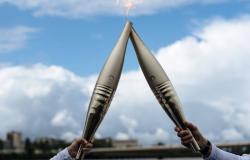As of: December 8th, 2024 9:51 a.m
After the Islamists’ victory in Syria, he could become the new strong man: Muhammad al-Jolani, head of the Islamist HTS militia. How radical is he? And what plans does he have for Syria?
The overthrow of Syrian ruler Bashar al-Assad was Abu Mohammed al-Jolani’s main goal. Now al-Jolani’s Islamist fighters have entered the capital Damascus and declared the city liberated – 13 years after the civil war against Assad began.
A “pragmatic radical”
Al-Jolani is the head of the Hajat Tahrir al-Sham (HTS) militia, a former branch of the al-Qaeda terrorist network in Syria. For years, Al-Jolani had operated in secret. Today he is in the spotlight, making statements and speaking to international media.
He gradually took off the jihadist turban that he wore at the start of the Syrian war in 2011 – in favor of a military uniform. Since his break with al-Qaeda in 2016, al-Jolani has tried to smoothen his image and appear more moderate.
However, this does not convince experts and Western governments. They classify the HTS as a terrorist group. Scientist Thomas Pierret of France’s national research institute CNRS calls him a “pragmatic radical.” In 2014, al-Jolani was at the height of his radicalism, says the expert, pointing out that he wanted to assert himself against the jihadist militia “Islamic State” (IS). Since then, he has “softened his rhetoric.”
Father was an opponent of Assad
Ahmed al-Sharaa, al-Jolani’s real name, was born in Saudi Arabia. His family originally came from the Golan Heights. But he grew up in Masseh, a wealthy district of Damascus. His father was a secular opponent of the Assad regime and spent many years in Syrian prisons before going into exile.
As a jihadist, his son took the fighting name Abu Muhammad al-Jolani. There are many indications that he now wants to shed this nickname as well as his reputation as a violent Islamist.
Battle in Iraq
His radicalization occurred long before the civil war in Syria. After the US-led invasion of Iraq in 2003, he left his homeland to fight in the neighboring country. In Iraq he joined Al-Qaeda and was subsequently imprisoned for five years.
In March 2011, as the revolt against Assad’s government began in Syria, he returned to his homeland and founded the Al-Nusra Front – the Syrian branch of al-Qaeda, which later became the HTS. In 2013, he refused to swear allegiance to Abu Bakr-Baghdadi, the future emir of ISIS.
In May 2015, al-Jolani stated that, unlike IS, he had no intention of carrying out attacks against the West. He also stated that if Assad were defeated, there would be no revenge attacks against the Alawite minority, from which Assad’s family comes.
Bridge with Al Qaeda
Al-Jolani also publicly broke with al-Qaeda years ago. He did this, as he explained, so as not to give the West reasons to attack his organization. According to Pierret, he has since tried to put himself on the path to becoming an “aspiring statesman.”
Egyptian military expert Mohamed Abdel Wahed also observes this change in image: “The insurgents have given up their previous jihadist tactics. Al-Jaholani has taken off the Islamic mantle and presents himself to the world through his interviews. He speaks more quietly and tries to use the vocabulary of a statesman .”
During de facto rule in northern Idlib province, HTS established a civilian government in the areas it controlled and established a state of sorts in Idlib province, while crushing its rivals. During this time, residents and human rights groups also accused HTS of brutal crackdowns against dissidents – the United Nations classifies these as war crimes.
Man of the hour
A jihadist as a statesman? Al-Jolani is currently the man of the hour in Syria. Many secular opponents of Assad are currently celebrating the insurgents’ advance as liberation.
But the skepticism remains. Al-Jolani had close ties to the terrorist organization Islamic State and was part of the Nusra Front, a Syrian branch of al-Qaeda. The United States put a $10 million bounty on his head. Whether he will manage to assert himself in Syria and what he plans to do afterwards – for example with the Kurdish-dominated SDF insurgents in the northeast of the country – remains to be seen.
With information from Moritz Behrendt, ARD Studio Cairo





